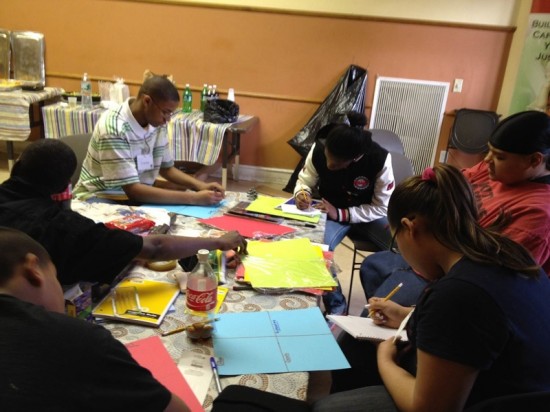
Non-profit offers alternatives to detention for youth
Lee was 14 when police arrested her at a South Bronx house party three years ago and charged her with trespassing. That was her first arrest. She was arrested three more times before graduating from high school, for similar charges and for fighting in school.
But the last time she was arrested, a Family Court judge sentenced her to complete a Mott Haven-based program for teens in trouble with the law. Had Lee not been referred to the program, she would have spent time in a juvenile detention center waiting for a court date.
Instead she was required to perform community service and undergo counseling, in order to get her charges dismissed. But while participating in the program, Lee did much more. She took on a leadership role in the program, helping other kids with similar offenses.
Like most of the teens referred to the South Bronx Community Connections program at Betances Houses Community Center on St. Ann’s Ave., Lee has stayed out of trouble with the law since entering the program.
“I’ve changed so much here,” said Lee at a June ceremony for its 30 most recent graduates.
Clutching an award for her role as a youth advocate, Lee told the crowd “I was here for something stupid. The guy that prosecuted me is here today–and you know what, I smiled because I’m standing here as a youth leader.”
The city and state have increasingly relied on programs like Community Connections as a way of reducing juvenile incarceration rates, in order to cut costs, and to respond to advocates and community members who say locking young people up is likely to turn them into criminals.
The state has announced it will soon begin releasing about 300 city teens being held in upstate juvenile facilities so they can return home. Family Court judges will refer them to alternative-to-incarceration programs like Community Connections.
But officials at the Mott Haven initiative and other alternative sentencing advocates hope the programs will not only provide a nurturing place for teens to go for a few months, but will help set them on a solid path.
“Most young people will age out of criminal behavior,” said Avery Irons, director of Youth Justic Programs for the Children’s Defense Fund, a non-profit. Irons added that young people can rebound well “if the system response was appropriate” and the criminal justice system’s role in the young person’s sanctions is minimized.
Teens at Community Connections are encouraged to take part in open discussions about subjects as far-ranging as the controversial Travon Martin shooting earlier this year in Florida and the role of hip- hop in society, and learn skills like graphic design and gardening.
“More of the young people have assault charges, and green space provides natural outlets for that,” said Raymond Figueroa, 45, who oversees teens’ community service at Brook Park in Mott Haven.
Two juvenile detention centers remain open in the city, including Horizons in Mott Haven. Together, they have capacity to detain up to 248 young people under 18. Last year, the city shut down Bridges Juvenile Center in Hunts Point, after activists had argued for decades that unsanitary and depressing conditions greatly reduced the chances young detainees could be rehabilitated.
“Young people have so much negativity being thrown around them” said Reverend Ruben Austria, who started Community Connections in 2009 with funding from the state’s Criminal Justice Division Services. “They need a positive community.”
Young people are mandated to attend alternative programs for up to 60 days, but Austria says he wants to create an environment stimulating enough that young graduates will choose to return on their own to help others.
“I thought it was going to be strict,” said Dizzy, 15, who was referred after being arrested for fighting in school. He spent 4 months gardening at a nearby park, as his community service. Now “I want to be a nurse–I want to help people,” he said.
“We were on the same page,” said Dizzy’s grandmother Demetria, adding coaches and organizers from the program frequently called her or came to her home to discuss Dizzy’s progress.
As South Bronx Community Connections for Youth enters its third year, Austria hopes the program will be replicated throughout the city. Community Connections last year began accepting young people referred from neighborhoods beyond Mott Haven and Melrose, but had to stop because of funding shortfalls.
“If the premise is you’re bad and we’re going to try to fix you, as opposed to we believe in you, you can understand why so many kids would want to leave their mandate as soon as it’s over,” he said.

[…] Read the Article […]
[…] don’t have the bandwidth to compete with bigger businesses,” said Knepper, who also works for Community Connections for Youth, a nonprofit that connects troubled local youth to urban farming […]